|
Crossing the boundaries into infidelity is like tiptoeing over a minefield, as it can detonate a relationship's foundation and unleash a cascade of harmful effects that not only impact both people’s health but adversely affects generations. Sadly, I observe the profound effects each day in the counselling room.
Here's the ultimate chapter in my ongoing series on the Top 10 Relationship Blunders I've been crafting over recent years.. I’ve tapped fingers to keyboard on this topic a few times before, particularly at this time of year as we’re about to head into the silly season and it deserves a big mention in this series. People are worn down, stressed out and let their guard down. I always receive plenty of grim feedback that it’s all too relevant and timely. So, I’m here to remind us that in a world of the “quick fix”, and as thrilling as these clandestine transgressions seem at the time, infidelity is a mistake fraught with consequences, and the harmful effects on both you and your partner's health can be profound and long-lasting. Why do people still tread amongst these minefields still today? Here are three main reasons I observe most often: 1. A misguided attempt to cope with the stress of life. Stress, that relentless beast, pushes us into seeking solace elsewhere. An affair or the repeated dopamine hit of getting that online match, the direct message into your Instagram inbox or the excitement of meeting up with someone new becomes a temporary escape. It is a tantalising mirage in a desert of monotony, the pressures of small business, demanding children or financial overwhelm. But what seems like a brief reprieve soon morphs into a catastrophic storm, leaving not just the betrayed partner emotionally unsafe, battered and broken but the betrayer, in a world of confusion, shame and self-loathing. As trust shatters, sleepless nights become the norm, and anxiety and depression creep in like uninvited guests.
2. Feeling valued by fresh adoring eyes to boost self-worth is another potent reason behind infidelity. Insecurities about one's own attractiveness, intelligence, or worth can lead people to seek affirmation and validation from someone outside their committed relationship to fill the void. It's intoxicating to think that someone else adores you, even if it is based on lies and deception. Your new person or people become the first you want to share your recent news with. The betrayed partner now feels discarded, unimportant, and unloved. The emotional trauma from this abandonment can manifest physically. The profound sense of betrayal cuts deep, so as the betrayer’s ego is momentarily boosted, the injured partner’s self-esteem is shattered leading to self-doubt and a painful sense of inadequacy. They are left grappling with a haunting question – "Am I not enough?" These emotional wounds can fester and lead to various health issues, from compromised immune systems to chronic stress-related illnesses.
3. One of the most common reasons is that needs aren't being met in the current relationship. Dissatisfaction can breed temptation. Instead of addressing their concerns with their partner, they opt for the thrill of a secret liaison. In essence, the mistake of crossing boundaries into infidelity isn't just a moral transgression; it's a genuine threat to the health and well-being of everyone involved, including children. The scars left by infidelity run deep, both emotionally and physically and whilst not always, I notice repeated behaviours passed down generations. So, before you consider stepping onto the treacherous tightrope of infidelity, remember that the thrill is fleeting, but the consequences are not. A healthy, honest, and loving relationship, based on trust and communication, is the antidote to the poison of infidelity. In the end, it's always wiser to keep the boundaries of your commitment strong and unbroken, for the sake of both your own well-being, that of your partner and particularly any children that may inadvertently emulate your example one day. Reach out to a professional therapist if you're struggling in this area. You can read more on my previous articles on this topic HERE. Joanne Wilson is the Relationship Rejuvenator and author of Renovate Your Relationship – All The DIY Tools For Your Most Important Project ($29.99). She is a neuropsychotherapist inspiring the community for thriving and dynamic relationships that impact generations for mental well-being. Find out more about her online courses at www.relationshiprejuvenator.com Stuck for ideas? Purchase Jo's Intimacy Inspirations Card Deck on sale for Spring. Help me decode the mystery of your inner desires and take my survey for free. Read this entire Top 10 Worst Relationship Mistakes series here. Photo by Eric Ward on Unsplash #2 of the Top 10 Worst Relationship Mistakes series: When your partner's past is your present16/8/2021 
Have you ever struggled to comprehend or accept your partner’s previous life before you? Maybe they can’t handle your horrible histories?
Welcome to Part 2 of my Top 10 Worst Relationship Mistakes Series. Here are some particularly challenging topics I’ve noticed when you can’t get past your spouse’s past: They’ve:
Questions you might naturally ask yourself:
10 successful tips that have helped couples I've worked with overcoming the demons of their past:
Don’t forget to check out Jo's Facebook Lives on Relationship Rehab with Jo to inject some relational inspirations into your week! Joanne Wilson is the Relationship Rejuvenator and author of Renovate Your Relationship – All The DIY Tools For Your Most Important Project ($29.99). She is a neuropsychotherapist inspiring the community for thriving and dynamic relationships that impact generations for mental well-being. Find out more about her latest relationships mini-course intake at www.relationshiprejuvenator.com Early-bird pricing concludes 21 August 2021.  Only those who trust, can find love and happiness. And only those who love, can be betrayed. Welcome to the final article of my four-part series on infidelity which featured:
The effect of an affair can be similar to the grief associated with death. It’s important to realise the common repercussions for both partners:
It is not catastrophising to note that discovering an affair creates a crisis! It is a devastating threat to your partner’s security and attachment needs. Consider the extreme emotional adversity and vulnerability from isolation and separation in the events of miscarriage, death, and life-threatening illnesses. This is not dissimilar. What now? Like many of these extreme events, couples can recover when there is demonstrated commitment toward remorse and forgiveness. It usually commences with understanding who the betrayer sought to “become” and what needs they yearned to fulfil? A usual pitfall for couples in recovery is for the betrayer to downplay what has happened in their efforts to repress any shame and guilt. This causes the injured partner to repeat questions and concerns all again with more fervour. It creates a painful cycle that traps them in isolation and pain. Some of the demonstrated commitment includes acknowledgement that a primary relationship rule has been broken. A focus on transparency, patience, reassurance and validation to repair the broken trust is required. It can take up to three years for trust to be re-established. In therapy, we collaborate on skills to manage flash-backs, obsessions and triggers and talk about the difference between reconciliation and forgiveness. Importantly, affair recovery recognises the needs of both partners, their longings and desires versus repeated shame for the betrayer. The greatest outcome is that couples build a stronger, shiny new and improved city of a relationship, far better than the one that was rocked in the earthquake of the affair. If couples decide to part, it is so important to unveil any resulting skewed beliefs about themselves or trusting others that can inhibit future relationships. May I highlight that it’s so fun to get fun and flirty in the Christmas season. It is my hope that this series has provided a warning as to the consequences when you’re doing it with the wrong person! Missed the first part of the series? Head to the blog on my website. Listen in to radio Salt 106.5 each Friday morning before 9am for my weekly chat on these articles. Joanne Wilson is the weekly columnist for the Sunshine Coast Daily Weekend magazine, weekly radio guest, professional relationship counsellor and certified clinical neuropsychotherapy practitioner of TheConfidante Counselling. She is based on the Sunshine Coast, Queensland - Australia. You can contact her at: www.theconfidantecounselling.com or email HERE. We’re up to Part Three of the tribulations of infidelity. Many people ask me if pornography is a contributing cause and is it bad for relationships?
This is an extremely controversial topic and always will be. As a Relationship Therapist I journey with clients without judgement and respect their opinions and values. With thanks to the contributions on this topic to Clinical Psychologist, Dr Clare Rosoman. Firstly, here are some interesting statistics from Pornhub. It is a pornographic video sharing website and stated to be the largest pornography site but certainly not the only one on the Internet:
Research has found that mutual use of porn was related to lower levels of distress but unrelated to relationship satisfaction in women. Some say that couples using porn together found it easier to discuss sexual wants and fantasies with their partners and had higher relationship satisfaction. Not surprisingly, people who only viewed porn with their partner reported more dedication and higher sexual satisfaction than those who viewed it alone. Consistent results across studies show the greater the discrepancy between partners in attitudes towards porn, the greater the negative impact on the relationship. Most discrepancies involve a male partner using more pornography than the female which lowers her relationship satisfaction reduces positive communication, creates instability, more relational aggression and lower female sexual desire. In summary, can it lead to affairs? Yes, but not always. Is it good for your relationship? Ask your partner. Joanne Wilson is the weekly columnist for the Sunshine Coast Daily Weekend magazine, weekly radio guest, professional relationship counsellor and certified clinical neuropsychotherapy practitioner of TheConfidante Counselling. She is based on the Sunshine Coast, Queensland - Australia. You can contact her at: www.theconfidantecounselling.com  I’m tackling the tricky topic of affairs in this four-part series. Last week I covered what can be defined as an affair? Today I’m writing about why people do it? Firstly, here are a few myths thanks to recommended author, Dr Shirley Glass and the Relationship Institute Australasia: The Soul Mate Myth: Attraction to someone else means that your spouse is not the right person. (Being attracted to or admiring someone means you’re breathing!) Affairs only happen to people with marriage problems: (They can occur in happy marriages however more likely the unintentional consequence of attraction, opportunity, failure to follow precautions and honour values). You can’t be friends with people of the opposite sex: (Friends of each partner need to be a friend of the marriage.) Affairs only happen when you’re not getting enough of what you need: (The spouse who gives too little is at greater risk, as less invested than the spouse who gives too much.) Why do people find themselves involved in an affair?
Next week: Does pornography lead to affairs? Joanne Wilson is the weekly columnist for the Sunshine Coast Daily Weekend magazine, weekly radio guest, professional relationship counsellor and certified clinical neuropsychotherapy practitioner of TheConfidante Counselling. She is based on the Sunshine Coast, Queensland - Australia. You can contact her at: www.theconfidantecounselling.com  I’m getting in ahead of the “silly” season of Christmas and New Year. It’s such a fun time when we start celebrating though unfortunately, there are more opportunities for the “silliness” to go too far with regretful consequences. It may well be easier to throw caution to the wind at the time, however acting on feelings harboured throughout the year such as resentment or lust can get you in a right pickle. For this reason, it’s timely to write about the topic of infidelity. The repercussions impact generations. They cause poor physical health, fuel alcohol and substance abuse, create symptoms for post-traumatic stress disorder and even result in suicide. Many people mistakenly think that infidelity isn’t really infidelity unless there is sexual contact. With special thanks to influencers for this series, Dr Jenny Fitzgerald, Dr Shirley Glass, Dr Sue Johnson, the Relationship Institute Australasia and Esther Perel, here is some clarification on what can be defined as infidelity?
Coming up in the ensuing weeks are: Why do people do affairs happen? What are the signs to look for? Pornography and affairs. Can you recover from affairs? Joanne Wilson is the weekly columnist for the Sunshine Coast Daily Weekend magazine, weekly radio guest, professional relationship counsellor and certified clinical neuropsychotherapy practitioner of TheConfidante Counselling. She is based on the Sunshine Coast, Queensland - Australia. You can contact her at: www.theconfidantecounselling.com An honour to contribute to the Melbourne Herald Sun in their Saturday feature: The public interest on this so very emotional, often devastating and confusing topic continues. Look out for our next supporting related article in our Relationship Hurdles Series. Online story: http://www.heraldsun.com.au/news/victoria/relationship-affairs-why-people-cheat-on-their-partners/news-story/416fbff85b6999381926b298ea4dede7
|
Joanne WilsonJoanne will be your Confidante, enabling you to speak freely in complete confidence and serenity. An integrated approach tailored to your specific needs will be utilised.
Categories
All
Archives
October 2023
|
Joanne will be your Confidante, enabling you to speak freely in complete confidence and serenity. An integrated approach tailored to your specific needs will be utilized. Approaches such as Psychobiological Approach to Couple's Therapy (PACT), Cognitive Behavioral Therapy, Solution Focused Therapy and Emotionally Focused Therapy may be incorporated.
Joanne WilsonRelationship Specialist for individuals and Couples online around the world and servicing areas for virtual sessions around Australia and servicing many clients in Queensland including Caloundra, Noosa, Noosaville, Buderim, Mountain Creek, Gympie.
|
Quick links |
|
Queensland - Australia
0409 909 933
www.relationshiprejuvenator.com
|
|
©
2017-2023 The Confidante Counselling . All Rights Reserved
Web Design by Debbie Navarro



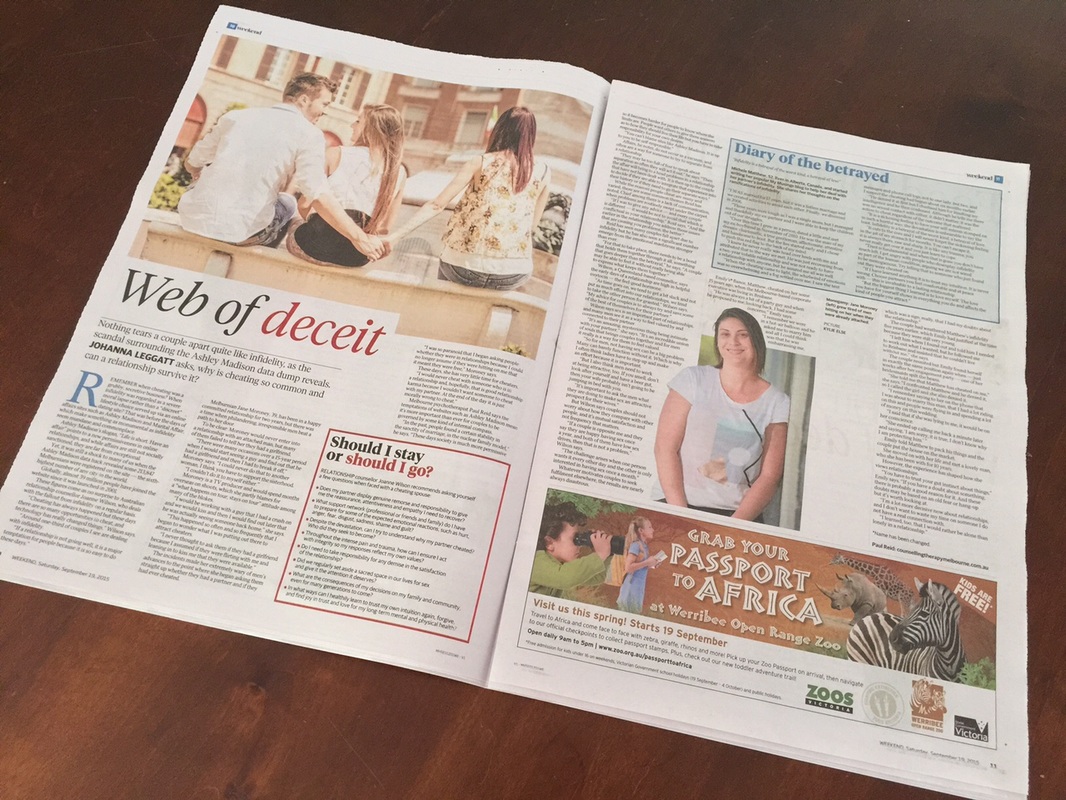
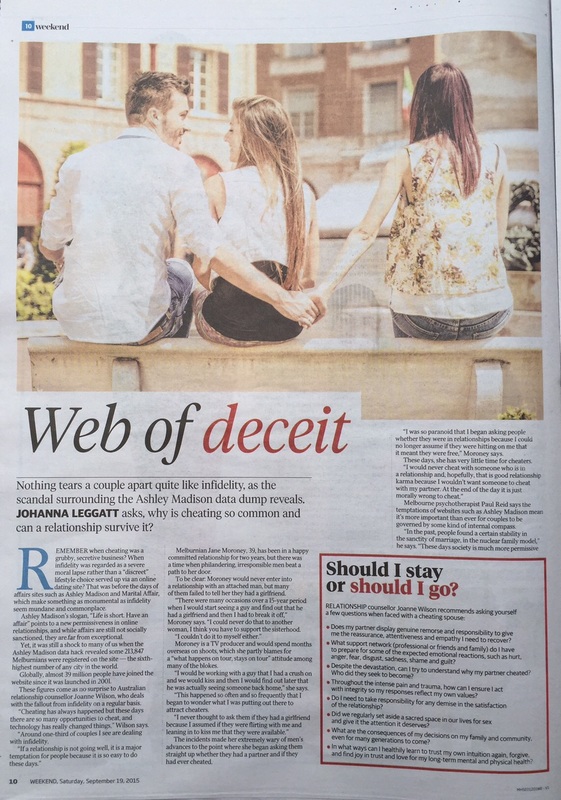
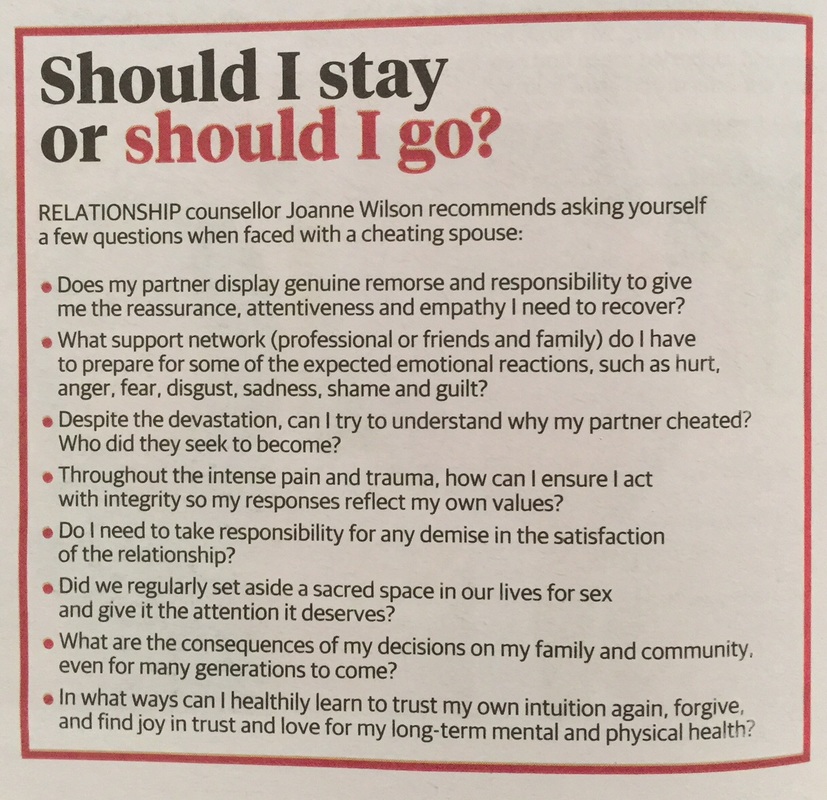
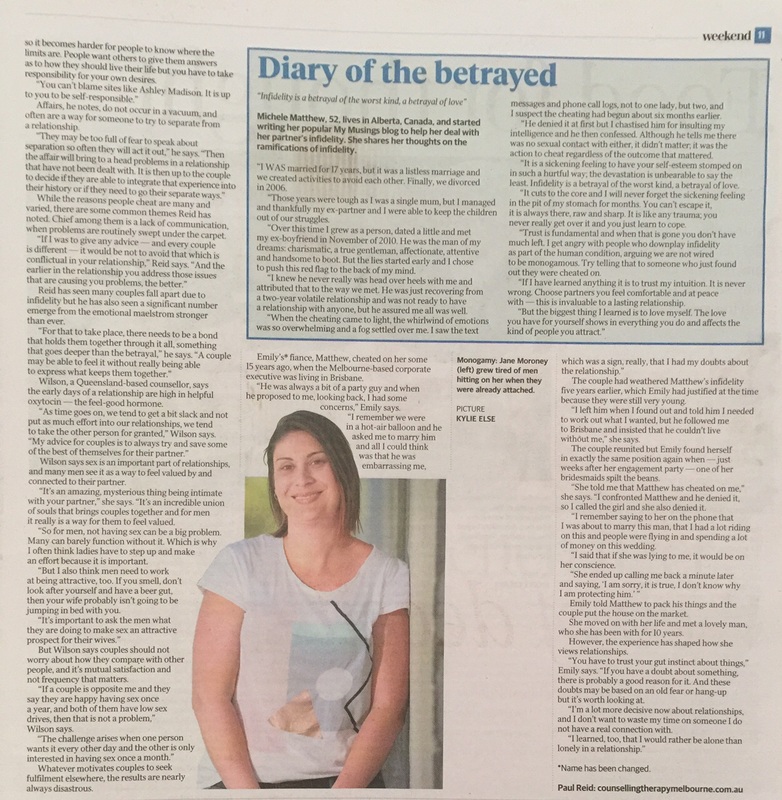
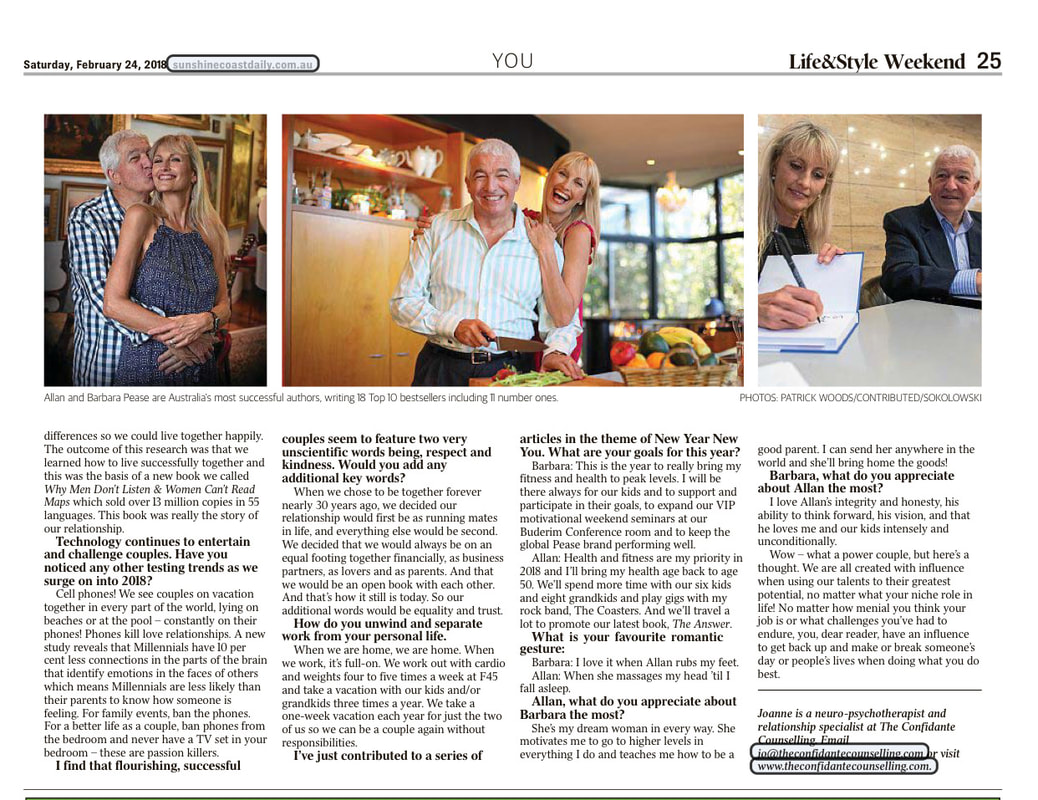
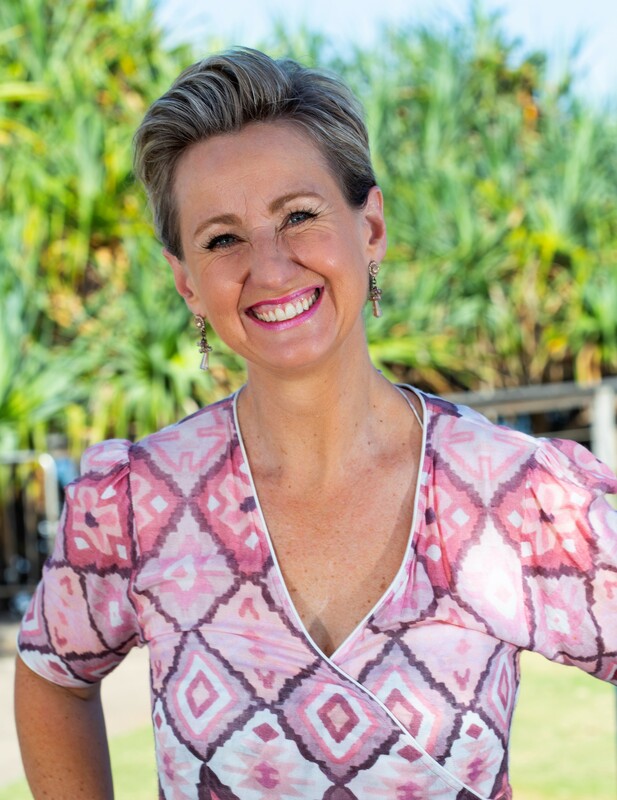
 RSS Feed
RSS Feed









